Digital sensing technologies in cancer care: A new era in early detection and personalized diagnosis
IF 10.61
Q3 Biochemistry, Genetics and Molecular Biology
引用次数: 0
Abstract
Digital sensor platforms are systems that integrate sensors with digital technology, which revolutionize data collection, processing, and transmission for enabling real-time, high-precision and automated diagnostics. These platforms often serve as the backbone of modern monitoring systems, enabling real-time data acquisition and analysis for a wide range of applications. Recent advancements in digital sensor platforms have paved the way for transformative innovations in cancer diagnosis. These cutting-edge technologies offer unprecedented opportunities to facilitate early detection, improve diagnostic accuracy, and personalize treatment methods. This review explores the landscape of digital sensor platforms in the context of cancer diagnosis, providing an overview of their principles, functionalities, and clinical applications. The review further illustrates that biosensors, lab-on-a-chip (LOC) devices and wearable sensors have leveraged on nanotechnology, biorecognition materials and artificial intelligence (AI) for revolutionizing cancer diagnosis. It consolidates the recent advances in digital sensor platforms for cancer diagnosis and the associated critical challenges, such as regulatory concerns, standardization, and ethical considerations. Further, the review summarizes the feasibility for the integration of digital sensor platforms with routine clinical practices for the development of efficient cancer diagnosis and treatment methods.
数字传感技术在癌症治疗:早期检测和个性化诊断的新时代
数字传感器平台是将传感器与数字技术集成在一起的系统,它彻底改变了数据收集、处理和传输,实现了实时、高精度和自动化诊断。这些平台通常作为现代监控系统的支柱,为广泛的应用提供实时数据采集和分析。数字传感器平台的最新进展为癌症诊断的变革性创新铺平了道路。这些尖端技术为促进早期检测、提高诊断准确性和个性化治疗方法提供了前所未有的机会。这篇综述探讨了数字传感器平台在癌症诊断中的前景,概述了它们的原理、功能和临床应用。这篇综述进一步说明,生物传感器、芯片实验室(LOC)设备和可穿戴传感器已经利用纳米技术、生物识别材料和人工智能(AI)来彻底改变癌症诊断。它整合了用于癌症诊断的数字传感器平台的最新进展和相关的关键挑战,如监管问题、标准化和伦理考虑。此外,本文还总结了数字传感器平台与常规临床实践相结合的可行性,以开发高效的癌症诊断和治疗方法。
本文章由计算机程序翻译,如有差异,请以英文原文为准。
求助全文
约1分钟内获得全文
求助全文
来源期刊

Biosensors and Bioelectronics: X
Biochemistry, Genetics and Molecular Biology-Biophysics
CiteScore
4.60
自引率
0.00%
发文量
166
审稿时长
54 days
期刊介绍:
Biosensors and Bioelectronics: X, an open-access companion journal of Biosensors and Bioelectronics, boasts a 2020 Impact Factor of 10.61 (Journal Citation Reports, Clarivate Analytics 2021). Offering authors the opportunity to share their innovative work freely and globally, Biosensors and Bioelectronics: X aims to be a timely and permanent source of information. The journal publishes original research papers, review articles, communications, editorial highlights, perspectives, opinions, and commentaries at the intersection of technological advancements and high-impact applications. Manuscripts submitted to Biosensors and Bioelectronics: X are assessed based on originality and innovation in technology development or applications, aligning with the journal's goal to cater to a broad audience interested in this dynamic field.
 求助内容:
求助内容: 应助结果提醒方式:
应助结果提醒方式:


